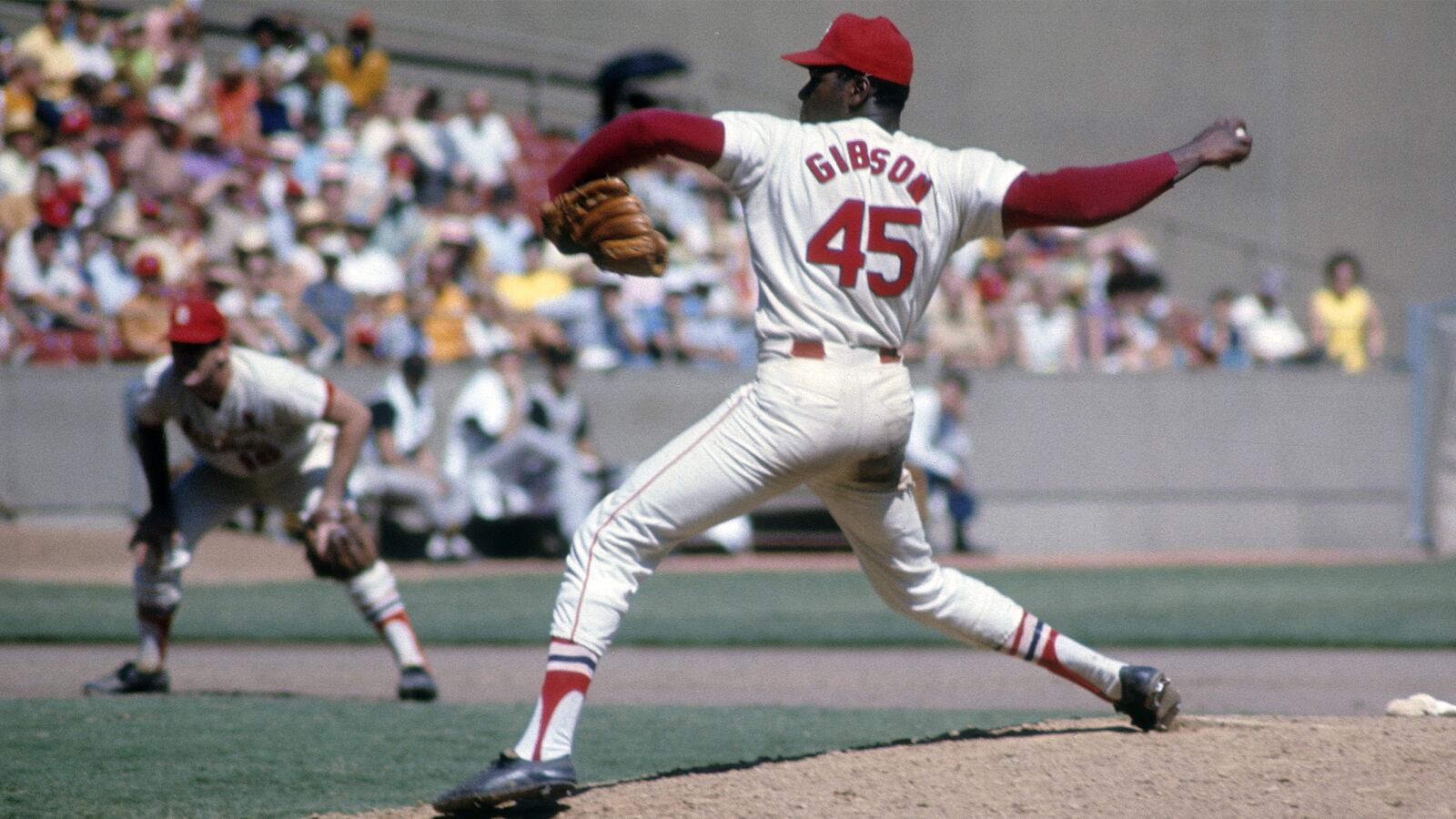In the opening game of the World Series 47 autumns ago, Bob Gibson did something nearly unimaginable. The fire-balling pitcher for the defending champion St. Louis Cardinals struck out 17 batters on a Detroit Tigers lineup that boasted its own share of firepower—the sluggers Al Kaline, Willie Horton, and Norm Cash, among others. Gibson made them look like Little Leaguers that day on his way to setting a record that has never been matched. It was the signature moment in what has come to be known as the Year of the Pitcher.
Now, as the World Series gets under way between the New York Mets and the Kansas City Royals, we have Pitch by Pitch: My View of One Unforgettable Game, a delightful and insightful new book by Gibson that dissects his achievement through the ingenious device of having him relive every pitch he threw on that steamy October afternoon in 1968 in St. Louis. It’s a framing device Virginia Woolf would have admired—crawling inside the mind of a gifted performer at the peak of his powers, and watching the gears work.
Gibson’s voice here is unaffected, loose-limbed, and sometimes very funny. While there’s a lot of inside baseball, the book is distinguished by Gibson’s ability to leave the river of the main narrative and drift into interesting eddies. He effortlessly shifts from thoughts on the next pitch to thoughts on the assassination of Martin Luther King, the Harlem Globetrotters, civil rights, baseball lore, and the coming of free agency that was championed by his teammate and best friend, Curt Flood, at great cost to Flood’s career and personal life. This book, like the man speaking it, is about a lot more than baseball.
Gibson, understandably, works hard to repair his image as a ruthless competitor who deliberately threw at opposing batters, a headhunter, a knockdown artist.
“I was, in fact, none of those things,” he writes. “I was simply a competitor who understood the need to keep a dangerous batter in his place and wasn’t timid about satisfying that requirement. If, in the bargain, the batter happened to get himself hit, he had nothing to complain about. He was awarded first base, after all.”
That “if the batter happened to get himself hit” speaks volumes. Some baseball fans will beg to differ with Gibson’s self-assessment—as will batters who felt the sting of the many Gibson pitches that drifted a little too far inside. But the man’s voice is so witty and so wise that he’s likely to win over even the most hardened skeptics. He certainly won me over. Reading this book is like sitting on a barstool next to a guy who has a hell of a story to tell, and knows how to tell it. You could listen for hours and never grow bored, and so you happily buy the drinks just to keep him talking.

And what a talker! As he unspools the chess match he played with every Tiger batter on that historic day—and with the opposing pitcher, Detroit’s flamboyant 31-game winner Denny McLain—Gibson reveals that he put a button over his locker before the series that proclaimed, “I’m not prejudiced. I hate everybody.” He invokes Damon Runyon and Henry Ford. He tells us that the 1934 World Series, also between the Cardinals and Tigers, was the first to be carried on commercial radio, and that his buddy Curt Flood was an avid reader of James Baldwin and Ralph Ellison, as well as an accomplished painter. Flood’s oil portrait of Martin Luther King was acquired by, of all people, George W. Bush.
I first learned about Pitch by Pitch back in the summer of 2014, when I was on a book tour promoting my novel Motor City Burning, which is built around the 1967 riots in Detroit, and the Tigers’ magical run to the World Series the following summer. When my book tour took me through Cincinnati, I took a little side trip up the Ohio River to the hamlet of New Richmond, to pay a visit to Lonnie Wheeler, a prolific ghostwriter who had collaborated on Hard Stuff, the autobiography of Detroit’s first black mayor, the acid-tongued and controversial Coleman Young. I’d gone to Lonnie’s house to talk about politics and race in Detroit, and about the art of ghostwriting. We wound up talking baseball.
When I told Lonnie that my novel culminates on the last day of the ’68 World Series, he surprised me by saying he happened to be collaborating on a new book with Bob Gibson about his record-setting performance in Game 1 of that year’s series. He told me his working title was Pitch by Pitch. In fact, it was Lonnie’s third book with Gibson, by far his favorite collaborator. (In addition to Coleman Young, Wheeler has also collaborated with baseball greats Hank Aaron, Reggie Jackson, and Mike Piazza.) “What I like about Gibson is that he so contravenes his public image—that of a hard, off-putting guy,” Lonnie told me that day at his house. “But in fact he’s earnest, he’s considerate, a genuine good guy. And a good conversationalist.”
When I finished reading Pitch by Pitch, I phoned Lonnie to congratulate him on a masterful job of capturing Gibson’s fluid, conversational voice. I also wanted to thank him for including Motor City Burning in the bibliography.
“Gibson gives you a lot to work with,” he said, adding that he and Gibson watched a videotape of Game 1 together, then augmented that with telephone conversations. I was surprised to learn that author and ghostwriter didn’t use a tape recorder.
As a lifelong Detroit Tigers fan, I couldn’t resist offering Lonnie a parting suggestion: His next book should be a collaboration with Mickey Lolich, the roly-poly Tigers pitcher who won three games during the ’68 World Series, including a stunning victory in the decisive seventh game over the seemingly invincible Gibson. I’d love to know what was going through Lolich’s mind on that afternoon.
“I hadn’t even thought about it,” Lonnie said with a laugh. “But yeah, it could make a good book.”
I agree, though Pitch by Pitch is going to be a tough act to follow.





